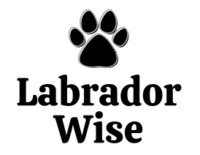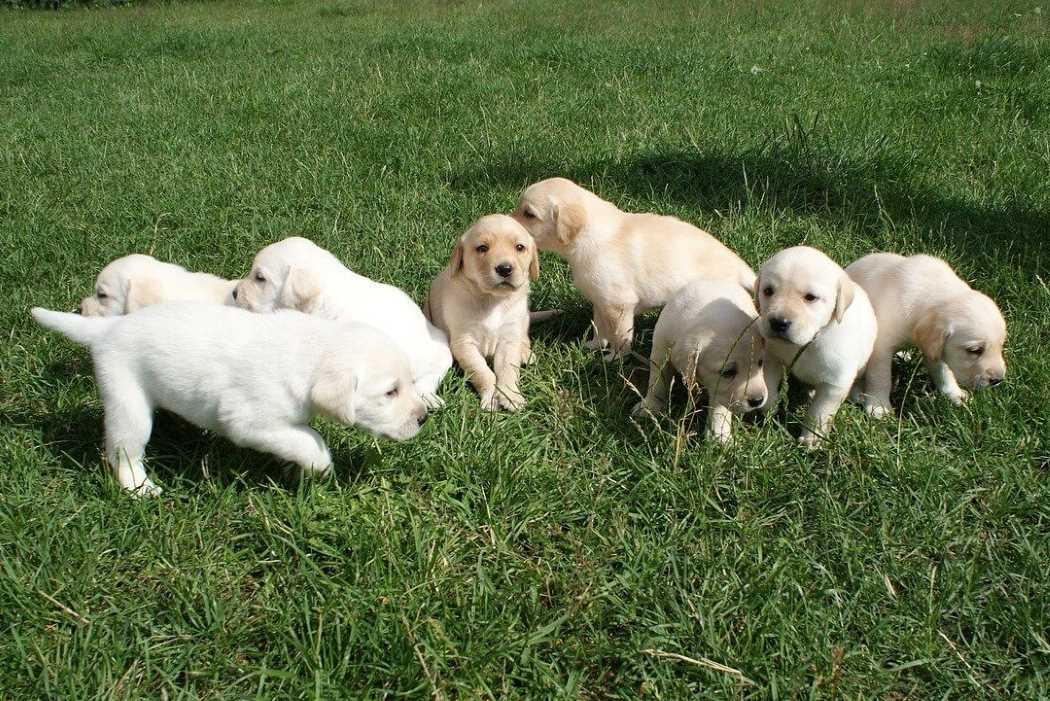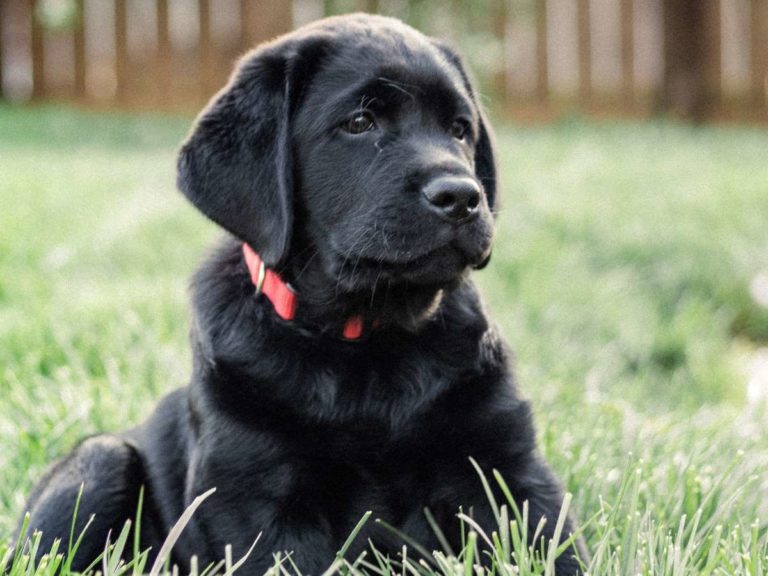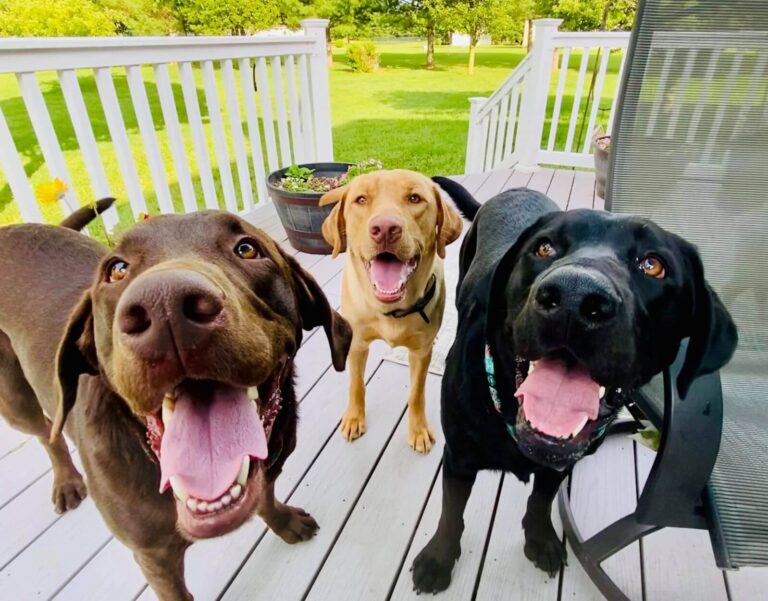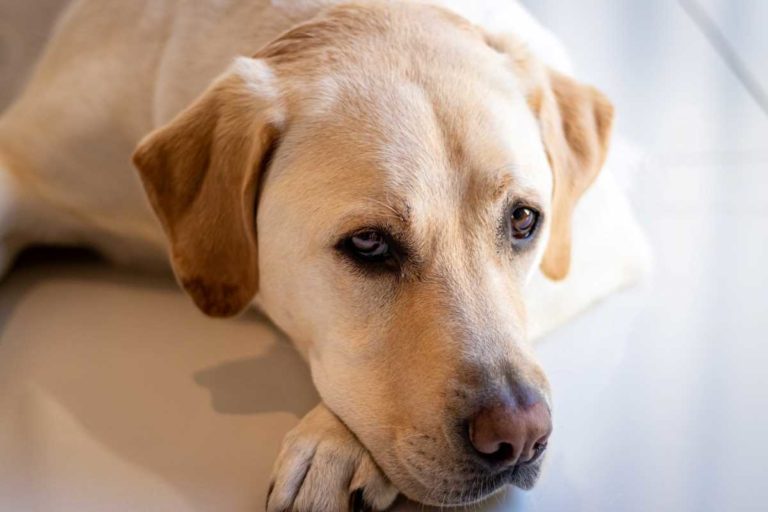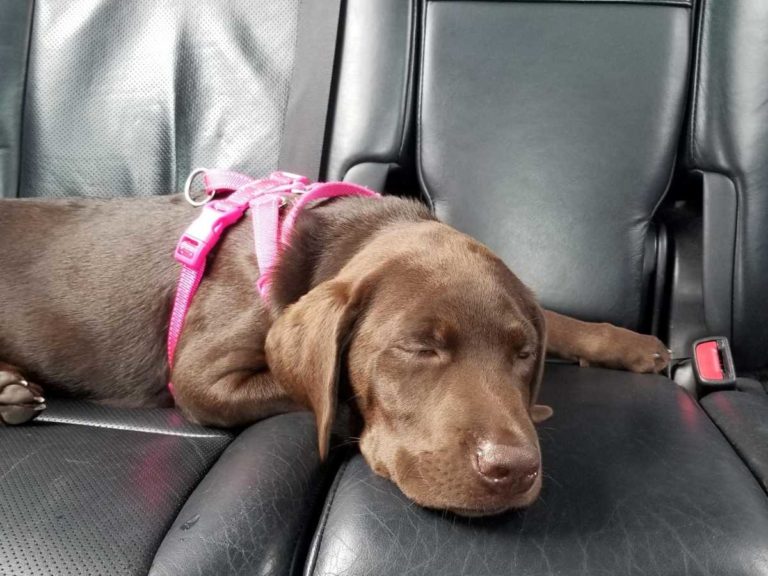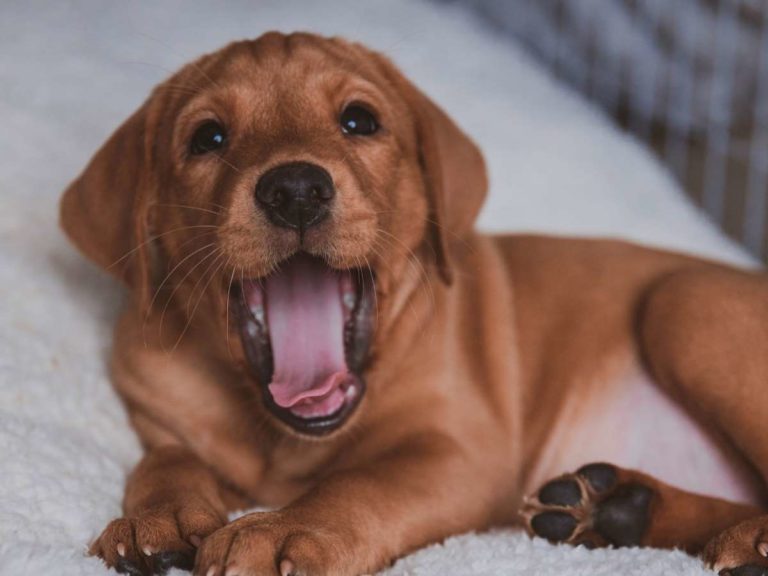Labrador puppies can be delightfully fun, but life with them can also bring along some unwanted behavior such as Lab puppy biting and nipping.
It’s a natural part of having an active, playful young puppy, and Labradors are known for being an especially “mouthy” dog breed.
Lab puppies have sharp teeth beginning in the first month of their lives, and though these teeth are small, they can definitely leave a mark!
Unwanted puppy biting can be painful for humans, as well as other pets in your household on the receiving end of this slightly painful puppy behavior.
(This article may contain affiliate links. As an Amazon Associate I earn from qualifying purchases. Learn more)
This is a behavior you’ll want to address when your dog is still young, before they become larger in size (with larger teeth as well).
How do you correct Lab puppy biting and nipping without the behavior continuing to cause problems for you and your dog?
Below we’ll identify the likely causes of problem puppy biting and nipping, and give you three solutions to gently correct your puppy’s unwanted behavior before this problem gets any bigger.
Causes of Lab Puppy Biting
Biting is a natural response for most puppies, especially Labrador Retrievers. It’s normal for your puppy to respond to their environment by putting interesting or tasty things in their mouths and biting.
Part of Early Puppy Life
If you observe a litter of young Labrador puppies still with their mother, you’ll notice that both the other puppies and the mother dog use their mouths to “communicate” with each other.
This is normal behavior for puppies, and not something to be concerned with. Most puppies will demonstrate playful puppy biting as a natural developmental stage.
Both the puppies and the mother dog will use their mouths (and biting) to move each other around, or work out issues during play or mealtimes.
Where you may grow concerned is when you continue to see this behavior in an older dog, or when you find that your playful puppy is leaving marks or scratches on you (or your family members).
Remember that almost all puppies play and interact in this way, and that it’s considered normal puppy behavior. What you don’t want is to encourage this behavior to get worse or to have it continue in an older dog where it becomes problematic.
As your puppy begins to get older (and bigger), the nipping and biting behavior should reduce naturally, but some dogs may require some training and intervention from you to correct it.
Labradors grow very quickly, and gain weight and size considerably in the first 6 months of life, so naturally Lab owners are often concerned about their puppies continuing to bite or nip as they become much larger dogs.
Playfulness or Excitability
One cause of Lab puppy biting and nipping can be your Labrador’s tendency towards excitability and having a playful personality.
Labradors are a very mouthy type of dog breed. They have been bred for several hundred years to be excellent field and water retrievers who are proficient at carrying wild game such as birds, ducks, and other animals in their mouths.
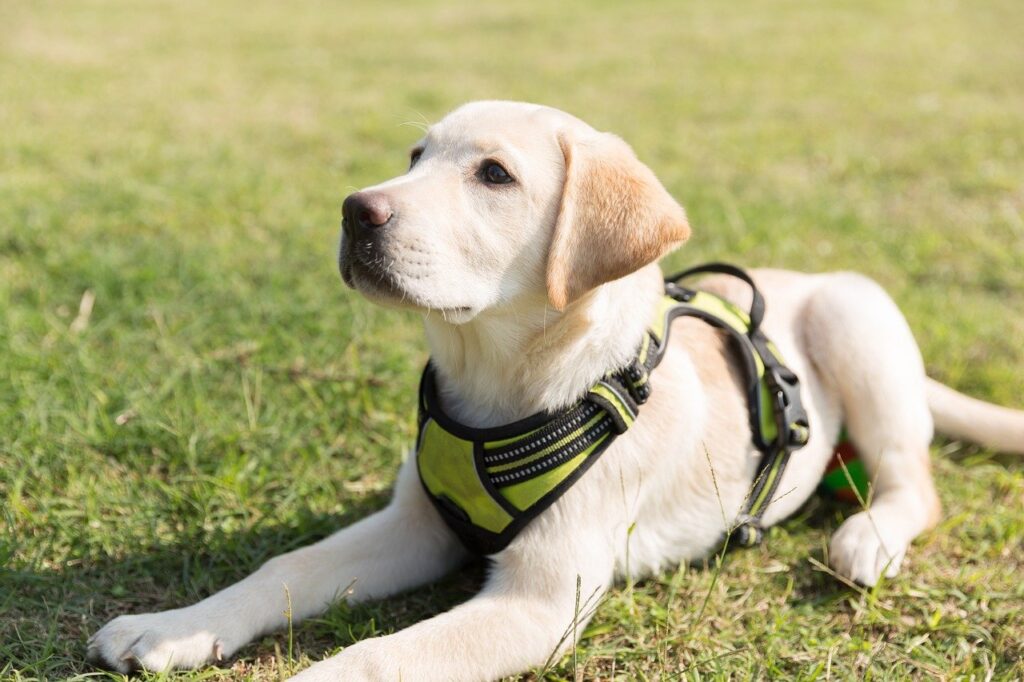
They’re also very active, athletic, and playful dogs, which are a few reasons why Labs have become such popular dogs for the past 30 years.
Labs are very excitable and often energetic dogs, bordering on hyperactive, so this enthusiasm and playfulness can result in biting and nipping due to playfulness.
An excited or playful Labrador will often go locate something to carry in their mouth when feeling playful, happy, or having fun.
A Lab puppy is more likely to use their mouth to communicate when excited or playing, which can translate to nipping or biting with excitement or over-enthusiasm.
Fear or Stress Response
Your Lab puppy may also demonstrate biting or nipping behavior in response to a negative experience with something in their environment. They may bite as a reaction to something that scares them, such as an unfriendly person or another dog.
Labs may respond with a sharp nip to another dog that is playing too roughly, or approaching them outside of their comfort zone.
Lab puppies who have not been well-socialized from a young age are more likely to react with biting and nipping towards other dogs (as well as people).
If your Lab puppy is around strangers or is in an unfamiliar environment, you may see more reactivity from them and more puppy biting or nipping. In this instance you may see or hear other behaviors such as growling, hackling, or teeth-baring.
Be careful when socializing your young puppy, especially when introducing them to other dogs or places (such as dog parks) where they can be quickly overwhelmed by the environment. You don’t want to trigger a negative response in your dog that results in unwanted nipping or biting.
Three Ways to Stop Lab Puppy Biting
What can you do to deter your Lab puppy from biting and nipping?
The good news is that Labs are a highly intelligent breed of dog that generally respond well to positive training in a quick and successful manner.
Your dog should respond to training techniques within a few sessions, as Labs are typically fast learners who love to please their human family members.
It’s important to give your Labrador puppy consistent and clear training to gently correct problem puppy biting, without harsh discipline or causing fear or harm to your dog.
Using harsh or harmful training methods may actually make your Lab more prone to biting out of fear, which is the opposite behavior you want to train for.
Let’s go over three techniques you can start implementing today to help reduce your Lab puppy’s biting and nipping problem.
1. Correct with a Clear and Gentle “No”
The best method to deal with typical Lab puppy biting is to correct your puppy with an immediate and clear command of “No” when they engage in biting your hands or other objects you don’t want bitten.
Some trainers will suggest you also “yelp” or whine when your puppy engages in biting your hand or other part of you, the purpose being to clearly communicate you are in pain and to get their attention.
You can do this if you prefer, but we’ve found it’s just as effective to strongly give the “No” command and remove your hand or other object from your puppy’s mouth, and then move on to step two below.
If your puppy is playing with you, you can stop playtime and give the “No” command. Don’t yell at your puppy or scare your dog.
Labs are sweet and typically sensitive and very loving dogs who do not need stern or strong fear-based correction. They are also usually very treat-oriented and respond better to positive techniques than harsh methods.
If you’re looking for a quick place to start with positive training techniques, we’ve used Zak George’s positive methods with great success with Labradors, which you can find on YouTube for free here.
2. Redirect Your Puppy’s Attention
After giving the “No” command to your puppy, immediately redirect their attention to something else you want them to do or focus on.
This can be redirecting them to another object in their environment, or changing what activity you’re doing with them.
For example, you can pick up a ball and begin a game of fetch, redirect their attention to another toy, or take them outside on a walk.
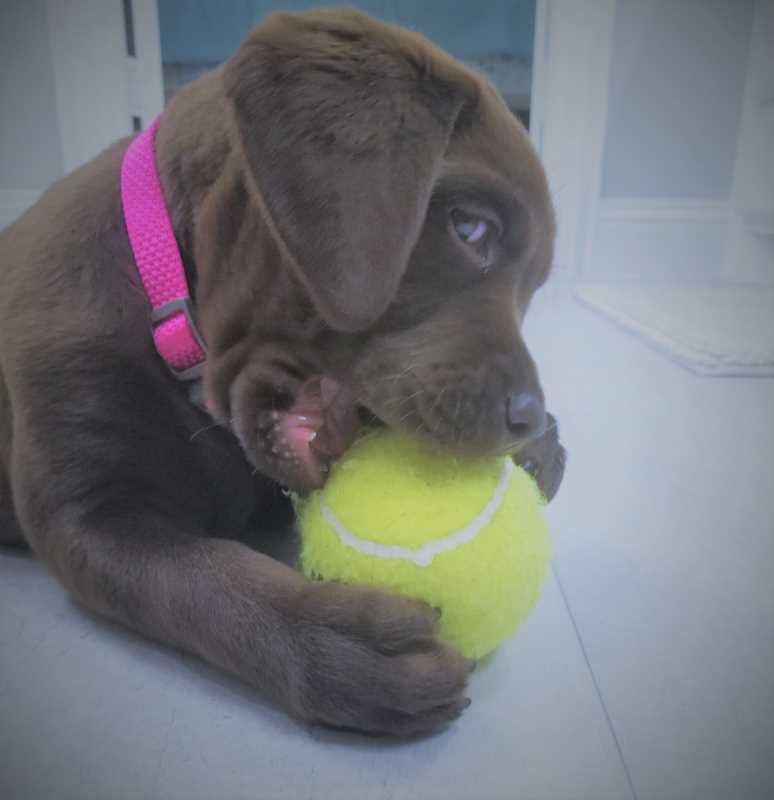
The important thing to do is redirect your dog’s attention away from the object (or person) they are biting or nipping.
If you find your puppy cannot be redirected quickly, or if they continue to engage in nipping or biting after your attempts to redirect have failed, you may need to remove them from the space.
This may mean you need to take them to their crate, for example, or outside to the yard. They may need to take a break from being around other dogs and people.
If your puppy is biting out of play or excitement, this will give them time to calm down a bit. It will also show them that play time is “over” if they engage in unwanted behavior.
You may need to do this numerous times until your puppy catches on, but your Lab puppy will soon learn that the fun seems to end when they begin to bite or nip.
If they are biting because they are overwhelmed, stressed, or beginning to get upset, removing them from the space will give them time to recover and have a break so they are less likely to bite or nip out of fear or stress.
Remain calm and patient, and don’t give them excessive amounts of attention during this process of redirection, because you don’t want to give them a reason to seek your attention in the future by doing a behavior you’re trying to extinguish.
3. Provide Appropriate Puppy Toys to Satisfy Their Need to Chew
As Labs are a very mouthy breed, they instinctively want to hold and carry things in their mouths.
While you may not appreciate having your hand in their mouth, it’s better to give them many options for other items such as toys that would be better for them to hold and carry.
It will also help with them being less likely to find and destroy other items in your home such as shoes, clothes, and furniture.
Have plenty of puppy toys such as Nylabones, Kong toys, and tennis balls for your Lab to carry, chase, and hold. Keep an eye on their condition and remove and replace them when they become overly-chewed or worn down.
Our Labs adore puzzle toys that can be chased, rolled, and bitten, which also provide mental stimulation for your dog. Both mental and physical stimulation and exercise are critical to managing a very active Labrador puppy.
You can sign up for subscription-based services also such as BarkBox that will give you a rotation of new and interesting toys for your Lab puppy curated based on their age and size.
It’s important to give your Lab puppy an appropriate outlet for their need to play, bite, and carry, rather than just expecting them not to want to use their mouths.
Some Labs are definitely more mouthy than others, and this behavior can last well beyond the first year of life. Make sure you’re prepared with plenty of toys that will give your Lab something to put in their mouth rather than your hand!
(Read More: 6 Must-Have Supplies for New Lab Puppies)
Summary: Lab Puppy Biting
Lab puppy biting and nipping is a normal part of life with Labrador Retrievers. It’s natural young puppy behavior that you may also see as a result of playfulness, excitability, or a reaction to stress.
However, there are a few things you can do to reduce this behavior and teach your puppy to stop biting and nipping, especially around people and other pets.
Using correct training methods, redirecting your puppy’s attention, and providing safe alternatives to chew and bite will help you stop the problem of puppy biting in your home. Before long, your Labrador will be grown, and you’ll be missing the days of puppyhood and fondly remembering even those little puppy bites!
